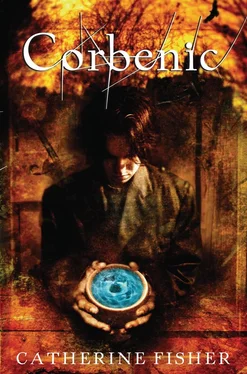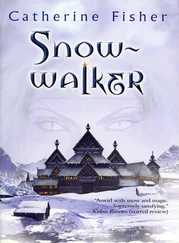Catherine Fisher - Corbenic
Здесь есть возможность читать онлайн «Catherine Fisher - Corbenic» весь текст электронной книги совершенно бесплатно (целиком полную версию без сокращений). В некоторых случаях можно слушать аудио, скачать через торрент в формате fb2 и присутствует краткое содержание. Издательство: HarperCollins, Жанр: Старинная литература, на английском языке. Описание произведения, (предисловие) а так же отзывы посетителей доступны на портале библиотеки ЛибКат.
- Название:Corbenic
- Автор:
- Издательство:HarperCollins
- Жанр:
- Год:неизвестен
- ISBN:нет данных
- Рейтинг книги:5 / 5. Голосов: 1
-
Избранное:Добавить в избранное
- Отзывы:
-
Ваша оценка:
- 100
- 1
- 2
- 3
- 4
- 5
Corbenic: краткое содержание, описание и аннотация
Предлагаем к чтению аннотацию, описание, краткое содержание или предисловие (зависит от того, что написал сам автор книги «Corbenic»). Если вы не нашли необходимую информацию о книге — напишите в комментариях, мы постараемся отыскать её.
Corbenic — читать онлайн бесплатно полную книгу (весь текст) целиком
Ниже представлен текст книги, разбитый по страницам. Система сохранения места последней прочитанной страницы, позволяет с удобством читать онлайн бесплатно книгу «Corbenic», без необходимости каждый раз заново искать на чём Вы остановились. Поставьте закладку, и сможете в любой момент перейти на страницу, на которой закончили чтение.
Интервал:
Закладка:
“What? What is it?” He was icy with fear. Shivering, sweating with fear.
Trevor glanced at Arthur, then back. His face was aged and stricken in the red flames. “It’s your mother.”
“What!” In agony Cal flung the broken sword down. “What? For God’s sake tell me! Tell me! ”
But it was Thérèse who came up and put her arms around him. It was Thérèse who told him that his mother was dead.
Stone
Chapter Seventeen
For when thou didst set out against her will,
pain leapt up in her . . .
Peredur
He edged the dusty net curtain aside and watched the street. Kids were in a gang on the corner, arguing. They climbed and perched on the old settee that was rotting there, absorbed totally in whatever the fight was about. One of them lit a cigarette, throwing the match down the drain. It amazed him that people could go on, as if nothing had happened. As if she was still alive.
The first night, with Trevor hushing the neighbors away into the back room, he had sat here and stared at the six o’clock news, waiting for the item to come up: woman, found dead in Bangor, the pills, the bottles of spirits. It hadn’t. It wasn’t important. It probably happened somewhere every day.
Now the taxi was turning the corner. It came up past the kids and crawled, looking for the number.
Cal glanced around, suddenly panicky. The room was quite empty, all the flat was. It looked stark and tiny and grubby; he could hardly believe all his life had been spent between these walls. He had a feeling he should be sentimental now, go around saying good-bye to places, like the room where . . . her room. But he couldn’t. He hated the place more than ever. He would never have to see it again.
Quickly, he picked up the rucksack and went outside, closing the front door with a clap, sending a few more flakes of its blistered paint scattering.
Sally must have been looking out; she was waiting by the taxi, and to Cal’s embarrassment she put her arms around him and squashed him to her. She was big, and smelled of soap.
“Bye, Sal,” he muttered.
Her eyes were red. “Look after yourself, boy. Give us a ring now and then, we’d be glad to hear from you, Cal. Don’t forget all about us.”
“No,” he said dully. He didn’t know what he meant by it. She was looking at him as if he was small and lost and he was and he couldn’t let her know, so he straightened up and got in the taxi and said, “The station,” as coldly as he could.
“Right, mate.” The taxi jerked and reversed and pulled away. Sally waved. He made himself wave back.
But once around the corner he sank into the seat, exhausted, as if some tacky elastic cord had snapped, and he was free. He couldn’t feel anything. He was numb.
There had been the funeral, in the big, cold church she had only gone to when she had nowhere else to go, and the cold rain in the cemetery, and all the neighbors looking at him. If it hadn’t been for Thérèse he’d never have gone through with it. They were all sorry, they said, but he knew what they thought. They blamed him. Going off, leaving her. They looked at his new work suit and the gray silk tie and they despised him. They were right to.
“Don’t blame yourself,” Thérèse had said. She meant well.
The inquest had been worse. Rhian had given evidence, a pretty woman with brown hair, flustered; she had come up to Cal after and said, “I’m so sorry,” and he’d thought that she didn’t know, did she, that no one knew except Trevor and Thérèse that he had killed her. That his staying away had killed her.
There had been doctors, and Sally and then Trevor, and the verdict had been left open, not even suicide, because she was so absentminded, Sally had said, and she might not have known she was taking too many. And she’d been drinking.
“Unfortunate,” the coroner had said. “An unfortunate and tragic event, and our sympathies to the family, especially her son.”
“Three pounds, mate,” the taxi driver said again, patiently.
Cal paid, got out, went into the station, sat and waited without thinking, staring at the advertisements on the wall, reading them over and over and not seeing them.
After Thérèse had left he and Trevor had cleared the flat. There had been the lopsided Christmas decorations to take down, and the tree, but Trevor had done that, because Cal had had to go out, away from it. She had tried. It was the trying that hurt him most.
Most of the furniture was cheap and worthless. Trevor had put an apron on and worked all day, grimly, barely speaking, phoning charity shops and dealers, getting everything sold: her clothes, the cups and saucers, the junk in the cupboards. His distaste had been silent and bitter. Cal had burned with shame at the mess.
“Take anything you want, mind,” Trevor had kept saying, and Cal had fingered old schoolbooks and smelled her cardigans, but there was nothing here he wanted.
Except, at the back of her bedside drawer, there was a picture he had drawn when he was about five, for Mother’s Day. The straggling writing was huge, copied from someone else at school, probably. Have a Happy Day Mummy . He had never called her that. Almost, he had cried then. A hot lump had come in his throat and his eyes had gone sore, but Trevor had called from downstairs, and he had rubbed his face and swallowed the lump and pushed the card into his rucksack. It hurt him. Like a wound. He didn’t know why he was keeping it.
The train came in and he got on it, and all morning he watched the woods and mountains and the tiny newborn sheep in the frosty fields, and the great expanses of sea at Rhyl and Colwyn Bay. People sat by him and came and went; he had a newspaper but he couldn’t read it, and finally at Crewe he got out and found himself sitting on the red metal seat on the platform reading the destinations board stupidly, as if he had been traveling forever and had never even started out.
She had killed herself. Sometimes he was sure of that, despite what the coroner had said; he imagined the scene in every detail, the Christmas tree, the bottles on the table. The pills. Her hands, taking one after another, deliberately, shakily. Her hands holding the cup. Sipping. And then, straight afterward, he wasn’t sure; it could have been an accident, she was drunk, she could easily have forgotten she’d already taken them. It was a nightmare seesaw of thoughts that he couldn’t get off.
Trevor had gone back to work two days ago, and Cal had had to stay in Bangor till everything was sold and the landlord had had the keys. Now there was nothing to go back for.
As the train rattled down through Cheshire and into the hills of Shropshire he knew that he was free, but the release of that was tiny against the terrible, cold stab of blame. It was his fault. And her fault. She had spoiled everything forever. He would never be free of her now; the blame and the shame of it would ruin his life, as she’d ruined it when she was alive, as she’d always ruined everything. It was too hard to think of; he hated himself. He got up and grabbed his rucksack and shouldered past the drinks trolley ferociously, down the carriage to the door and he had hold of the door and was pulling it and pulling it, just to get some air, to get away from the thoughts, to get out.
“Son.” A hand on his arm. “Son. Take it easy. The door’s locked.” The guard. Two women behind him, looking scared and concerned. A whole carriage of horrified faces.
Cal took his hands off the door and stepped back. He was shaking, his back wet with sweat.
The guard said, “It’s okay.” He had hold of Cal; Cal went weak at the knees.
The guard flipped down the overflow seat and turned quickly. “Get him some tea,” he said.
Читать дальшеИнтервал:
Закладка:
Похожие книги на «Corbenic»
Представляем Вашему вниманию похожие книги на «Corbenic» списком для выбора. Мы отобрали схожую по названию и смыслу литературу в надежде предоставить читателям больше вариантов отыскать новые, интересные, ещё непрочитанные произведения.
Обсуждение, отзывы о книге «Corbenic» и просто собственные мнения читателей. Оставьте ваши комментарии, напишите, что Вы думаете о произведении, его смысле или главных героях. Укажите что конкретно понравилось, а что нет, и почему Вы так считаете.








